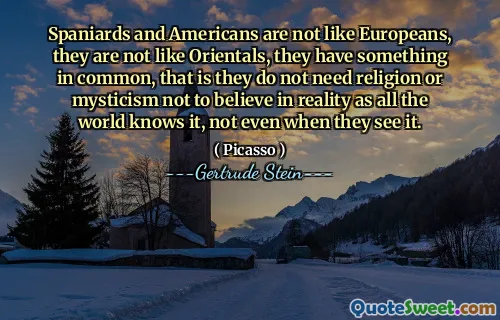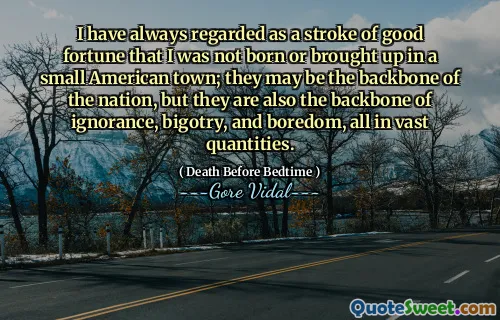
Spaniards and Americans are not like Europeans, they are not like Orientals, they have something in common, that is they do not need religion or mysticism not to believe in reality as all the world knows it, not even when they see it.
This quote explores the nuanced perception of cultural beliefs and their relationship to reality and faith. It highlights a contrast between different groups – Spaniards and Americans on one hand, Europeans and Orientals on the other – suggesting that the former share a unique characteristic: an inherent confidence in reality without the need for religion or mysticism to validate their experience. This notion invites reflection on how culture and worldview shape our understanding of truth. The quote seems to imply that some cultures may lean more heavily on faith or mystical perspectives to interpret reality, whereas others confront it directly, perhaps with a more secular or pragmatic attitude.
The assertion that Spaniards and Americans “do not need religion or mysticism not to believe in reality” challenges conventional assumptions about belief systems. It suggests a kind of realism or direct engagement with the world that transcends religious or mystical frameworks. This raises intriguing questions about the role of spirituality and belief in shaping human cognition and experience. Does the reliance on religion or mysticism alter our perception of reality? Is there a cultural predisposition toward embracing either faith or skepticism?
Furthermore, the quote implicitly critiques the dependence on mystical or religious constructs by underscoring the capacity to accept reality even when it is evident, perhaps also highlighting a certain skepticism towards the mystical as a veil from truth. It invites readers to consider how cultures interpret and authenticate their experiences, and how belief systems either clarify or obscure what is real. This reflection enriches our understanding of cross-cultural perceptions and the varied ways humans seek meaning in existence.





